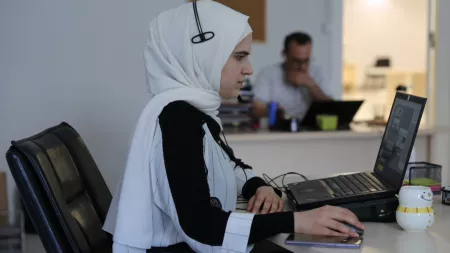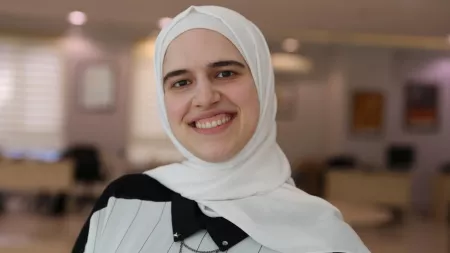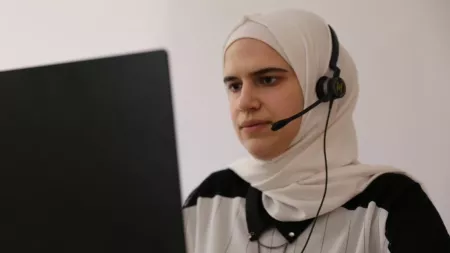Imagine finally finding safety after fleeing to another country, having survived war, loss, and crisis for multiple years – and yet, once more, another disaster is in front of your door. Tremors wake you up in the middle of the night, and you barely make it out of your house on time, in utter terror, only to find yourself as a part of a scenery that is no less than a total catastrophe. Sirens are outracing each other, the air is full of dust from collapsed buildings, and just like you, people in their pajamas are scattered on the streets unsure what to do next. Just like you, most people feel they are suddenly in a war zone.
This is what many residents living in southeastern Türkiye experienced immediately after the February 6 devastating earthquakes, which took thousands of lives and injured thousands more.
And among their most pressing needs, was to have access to timely and accurate information.

Adapting CARE’s Helpline to the earthquake response
Established at the beginning of the COVID-19 pandemic in 2020 with the support of the European Union, CARE Türkiye’s helpline, which has been serving as a multi-purpose information line for the refugee and host communities living the South-central provinces of Türkiye, had to be adapted immediately after the earthquakes to meet the emerging needs and requests of those affected CARE helpline workers themselves were among those affected, while the service itself went through a difficult test of resilience.
“Everyone was severely affected across the region, including the call center operators themselves. We needed some time for our staff to ensure theirs and their family’s safety; but there was no time to waste and very quickly we were back and ready to work. We were able to resume on the 10th of February, only 4 days after the earthquakes and we immediately updated our helpline package with information about new services, announcements regarding affected areas, earthquakes predictions, and announcements about points of aid delivery and available shelter”, says Ahmed Aldej, coordinator in charge of CARE’s Helpline.
The scale of the disaster was harrowing. The Turkish Government did not lose time to declare a state of emergency to facilitate aid efforts. Dena Kupa, a 25-year-old graduate of Ankara University who has been working as a Helpline operator since December 2022 remembers very vividly the days immediately after the earthquakes.
"I remember also speaking to people who survived but you knew from the sound of their voice, they were dead inside,"Dena recalls her experience as a Helpline operator in the aftermath of the earthquakes in Türkiye.
“We extended our working hours from 8am to 6pm and we were receiving calls 7 days per week for a month. In February 2023 alone, the helpline received around 800 calls”, she recalls. “It was a very hectic period and people calling us were very understanding of the fact that due to the emergency we were all facing, we had to prioritize the most urgent ones. I also received calls from people who only needed someone to talk to and feel they are heard and not alone. One case I will never forget is the case of a woman who has lost her husband and one of her children. She has been under the rubble for a few days. She was rescued and transferred to the hospital of Adana, where she had to have her legs amputated. Her two other children were transferred at the same time to relatives in another province. She called us and shared her story because she had to leave the hospital, but she had no home, while she also needed help to be reunited with her children. We prioritized this case immediately and we spoke with the local authorities to provide shelter and cover her immediate basic needs, while we also supported arrangements for her to be reunited with her children.
One day, I received a call from a number which was registered in our system given prior contact made under a female name. I answered the call and listened to the voice of a man. Following our standard procedure, I had to ask him to confirm the identity of the holder of this mobile number. He immediately said ‘Ok, she died. She is my daughter and now her mobile is with me’. At that point I needed a few seconds to find my words. This man has lost his wife and his daughter in the earthquakes. We linked him with the case management department of CARE to provide shelter and other services.”

CARE has also been paying special attention to the special needs of groups of vulnerable people and communities. These groups included people with disabilities and chronic health diseases, or families with dependents who could not travel even the shortest distances due to lack of means or special equipment.
“We were helping with arrangements for equipment such as a wheelchair to people with disabilities who have lost their much-needed medical equipment, and we supported people with medical needs to find appropriate shelter. For example, a mother of a child with autism was living in a camp in a crowded tent and she called us to ask for support in finding a more appropriate shelter. Until today we receive many calls from parents asking for mental health support for their children who are suffering from post-traumatic stress disorder and present symptoms such as urinary incontinence. We connect these cases with mental health providers and CARE’s psychosocial support department”, ends Dena.
Currently funded by O2O, the state of USA and the European Commission, CARE’s Helpline has been evolving constantly.
“As time progresses, requests for emergency shelter have given way to requests about financial aid, special needs aid, or available protection services. What is certain is that it will take more time, will and effort to recover from such a wide scale of shock and CARE’s Helpline team will continue responding to these needs to the best of our ability. We will continue to evolve our services as the needs and the requests we receive evolve too”, ends Ahmed Aldej, coordinator in charge of CARE’s Helpline.
